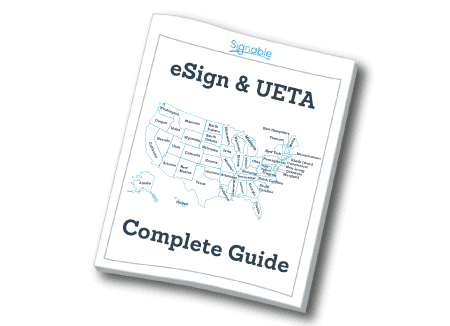Electronic signatures in Illinois
Electronic signatures Illinois, what the law says…
It is also, simply, yes.
Illinois falls under the ESIGN act, as it is federal law. But, they have not adopted the UETA act. In fact, Illinois has their own Electronic Commerce Security Act, the ECSA. This takes care of electronic signature regulations It is modelled on the ESIGN act.
It specifies that information, records, and signatures are not to be denied legal effect, validity, or enforceability only because it is in an electronic form. Similarly ESIGN, the ECSA doesn’t require businesses and individuals to use electronic signatures, but governing bodies are usually required.
Also, much like the UETA act, electronic signatures cannot be denied admissibility into evidentiary legal proceedings in Illinois simply because the signatures are electronic or because the signatures are not “original”. Overall, the ECSA mirrors most, if not all, of the demands of the ESIGN and UETA acts.
The state government are in the process of updating their laws to make them more consistent with ESIGN and UETA.
What are the eSign & UETA Acts?
In the ESIGN and UETA acts, there are four major requirements for an electronic signature to be recognized as legal under U.S. law. The eSign act is known as federal law.
The UETA & eSign requirements for Illinois are:
1) Intent to Sign
No different than a wet signature, e-signatures are only considered valid if a user demonstrates a clear intent to sign, which Signable provides.
2) Consent to do business electronically
There must be expressed or implied consent from the signing parties to do business electronically. Signers also have the option to opt-out.
3) Clear signature association
Signable provides a clear and detailed audit trail that provides clear signature association once everyone has signed a document.
Everyone involved receives an email that includes the completed electronic document attached as a PDF and a certificate of signature.
The certificate of signature is an important document that includes important information including:
- Who each signing party is
- Dates, time stamps, IP addresses and fingerprints
- A full audit log or audit trail
4) Record retention
E-signature records are only valid as long as they can be reproduced if required. Signable provides a signed copy via PDF and allows parties to download the document when required.
Signable provides all of the above, meaning that you can trust your documents will be legally binding in the US.
It’s worth noting that in the US electronic signatures and digital signatures are both popular and we provide e-signature services.
You can find out more about the difference between an electronic signature and a digital signature here.
What documents can’t be signed under these laws?
We’ll include a link to the full list of documents that are currently not available for electronic signing in the US. But, to name a few:
- Documents relating to adoption, divorce and other family law matters
- Some types of real estate transfer documents and other real estate agreements
- Court orders, notices, and other court documents like pleadings and motions
- Some types of powers of attorney
- Wills, codicils, and testamentary trusts
- It’s also worth noting that last year the Uniform Law Commission declared eSignatures legal for wills BUT only in some states, so follow the link included below to see if will eSignatures are legal your state.
Start sending documents, free
Experience Signable for yourself with a free 14 day trial
